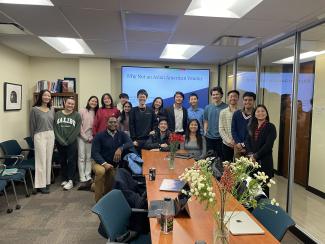
We invite you to read the fallowing short article co-written by Dr. Rupa Pillai, ASAM Senior Lecturer and students from her course The Asian American Entrepreneur, were they share their research project.
How to Better Support Asian American Entrepreneurs at Penn
By Kira Lu, Christiana Guan, and Rupa Pillai
Since 1986, Penn has committed to using its purchasing power to support minority-owned businesses in the Philadelphia area through initiatives such as the Supplier-Inclusion Diversity Program. These programs have helped women, Black, Asian, Latinx, LGBTQ+ and other minority-owned businesses be hired by Penn for services from catering to construction. Although almost 30% of the over $100 million spent locally by Penn went to minority-owned businesses in 2022, certain minority-owned businesses are not well positioned to benefit from Penn’s current economic inclusion initiatives.
As part of a newly implemented Academically-Based Community Service course through the Netter Center, the students and instructor of “ASAM 1020: The Asian American Entrepreneur” explored the challenges preventing the Penn community from engaging with Asian American Entrepreneurs (AAEs) and vice versa in the course’s capstone research project. Collaborating with Penn’s Supplier-Inclusion Diversity Program and Asian American Chamber of Commerce of Greater Philadelphia, our team designed a research project to understand what factors impact the hiring of Asian American owned restaurants for catering. Our team drew upon the existing scholarship on AAEs and the social scientific methods learned in the course to design our study. Surveys and interviews with Penn Procurement Services (PPS), local AAEs, and Penn students and staff revealed that AAEs make up one of the smallest subgroups of Penn-preferred contractors. Thus, it may be more difficult for Penn students and faculty to choose AAEs for catering services compared to other businesses. Also, AAEs may face unique challenges in gaining access to this university network.
Our team learned that Penn students and staff prioritize price and convenience and that they also have varying levels of awareness of the resources available within PPS to work with diverse suppliers like AAEs. Interviews with AAEs who interact frequently with Penn and its students revealed several advantages to working with Penn, including more timely payment through diversity initiatives to support minority-owned businesses. We found that most of these relationships were established organically with businesses already working with Penn, presenting challenges for AAEs who do not already have strong connections to Penn. Further, AAEs may face more difficulty benefiting from such programs because they lack language skills, the technology, personnel, and time to learn and navigate the bureaucracy of PPS. For example, our interviews with AAEs who were fluent in English, shared difficulties in completing the paperwork necessary to be paid, suggesting that AAEs and other minority-owned businesses who are ESL speakers may face additional difficulties in working with Penn.
Based on the obstacles revealed through our research, we identified a few ways we can better support AAEs and other minority-owned businesses at Penn through catering. To begin, if you are a Penn student or staff member making purchases check out PPS tools such as the Supplier Search or Catering@Penn tools to identify minority-owned businesses to work with. Be aware that a business may be minority-owned, but not listed as such in the tools. For example, some AAEs on the supplier search are not identified as Asian through the Supplier Search tool. We also recommend looking at a broader range of AAEs when searching for your next catering event, such as this list curated by the Asian American Chamber of Commerce of Greater Philadelphia. Utilizing such lists will help businesses with no relationships with Penn complete the process so that they make it onto Penn’s supplier search tool, which will make it easy for you and the rest of Penn to purchase from them in the future. PPS, aware of the difficulties navigating their website and its bureaucracy, will be using our findings to devise better outreach strategies to reach and support AAEs. In particular, the Supplier-Inclusion Diversity Program will be collaborating with the Asian American Chamber of Commerce of Greater Philadelphia more to translate materials and offer more trainings to help AAEs become diversity suppliers so they are better positioned to benefit from Penn’s economic inclusion initiatives.
On behalf of ASAM 1020, we would like to extend our gratitude to the Penn students, staff, and AAEs who offered their time, experiences, and insights to this research project.
